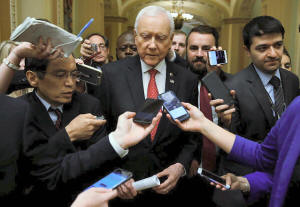|
Senate Republicans weigh tax cuts,
deficit expansion
 Send a link to a friend
Send a link to a friend
 [September 20, 2017]
By David Morgan [September 20, 2017]
By David Morgan
WASHINGTON (Reuters) - U.S. Senate
Republicans have reached a tentative budget deal that could allow tax
reform legislation to eliminate as much as $1.5 trillion in revenues
over 10 years through tax cuts, raising the odds that their planned tax
overhaul would expand the federal deficit.
Two members of the Senate Budget Committee, Republicans Pat Toomey and
Bob Corker, announced the formal agreement late on Tuesday, but their
joint news release did not provide dollar figures for revenue reduction
or tax cuts.
The prospective tax cuts are part of closed-door talks among 12 Senate
Budget Committee Republicans who are drafting a fiscal 2018 budget
measure needed to help the 100-member Senate pass a tax overhaul with as
few as 51 Republicans votes and prevent Democrats from blocking the
legislation.
The U.S. economy is in a steady expansion and stock markets are rising.
But the tax cuts being weighed by congressional Republicans, with
encouragement from President Donald Trump, are on a scale normally
reserved for times of economic hardship and intended to drive annual
economic growth above 3 percent.
Trump campaigned last year on a promise of comprehensive tax reform. But
Republicans have made little tangible progress toward that ambitious
goal so far.

Toomey told reporters he is confident that Republicans will agree to a
budget resolution that foresees a deficit in the first decade. He said,
however, that talks have not settled definitively on $1.5 trillion.
"I'd like to see a bigger number," said Toomey, who argues that tax cuts
would increase economic growth.
In their joint news release, Toomey and Corker said they agreed on a
budget resolution that would use a standard analysis of the impact of
the tax cuts on the deficit. Some Republicans like Toomey have pushed
for a "dynamic" model, which tends to assume an increased economic
stimulus effect from tax cuts, resulting in smaller projected increases
to the deficit.
Senator John Thune, a member of the Senate Republican leadership team,
said he expected the agreement to provide maximum flexibility to craft a
tax overhaul capable of driving economic growth and ultimately raising
worker wages.
But looming in the background is Washington's steady flow of red ink
that adds every year to the $20 trillion national debt, a target of
outrage not long ago for Republican "fiscal hawks." In recent weeks,
some fiscal hawks have expressed a willingness to consider deficit
financing for tax reform but many at levels well below $500 billion.
[to top of second column] |

Senator Orrin Hatch speaks to reporters after meeting with U.S.
Secretary of the Treasury Steven Mnuchin and Director of the
National Economic Council Gary Cohn and Republican law makers about
tax reform on Capitol Hill in Washington, U.S., September 12, 2017.
REUTERS/Joshua Roberts

Toomey's comments suggest Senate Republicans may be looking to
deficit spending as a way to cut taxes on businesses and individuals
while avoiding hard decisions that would be needed to raise taxes
elsewhere or eliminate popular tax breaks.
If adopted by Congress in a budget resolution, the $1.5 trillion
figure would set a ceiling on how much revenue tax reform could
eliminate over 10 years.
Analysts and Democrats have warned that higher deficits resulting
from tax cuts would eventually overwhelm economic growth at a time
when U.S. interest rates are set to rise.
Senate Finance Committee Chairman Orrin Hatch, whose panel would use
the budget figure in crafting a tax reform bill, told reporters he
was not sure that revenue losses of $1.5 trillion were needed for
tax reform.
Senator Ron Wyden, the Senate Finance Committee's top Democrat,
dismissed the development as a distraction from the more important
question of how Republican tax reform would ultimately benefit the
wealthy.
"It looks to me like yet another trial balloon," Wyden said.
Republicans have been unable to agree on how to pay for tax cuts and
other proposed tax changes, aside from arguing that some lost
revenue would be clawed back from the buoyant economic growth they
believe tax reform will deliver.
"There's no way you're going to be able to do tax cuts that pay for
themselves," said Louisiana Senator John Kennedy, another budget
committee Republican. "But I think most people would concede that
cutting taxes does stimulate the economy."
(Reporting by David Morgan; Additional reporting by Amanda Becker;
editing by Kevin Drawbaugh and Lisa Shumaker)
[© 2017 Thomson Reuters. All rights
reserved.]
Copyright 2017 Reuters. All rights reserved. This material may not be published,
broadcast, rewritten or redistributed.
 |